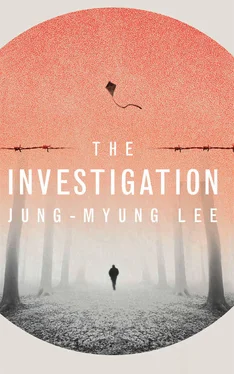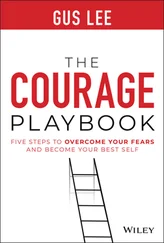‘331!’ My voice was sharp, frightening even myself.
He replied gruffly. ‘My name isn’t 331. It’s Choi Chi-su.’
‘Not your Korean name. Give me your Japanese name!’
‘I don’t have one,’ he said, a jeer staining his lips. ‘I don’t care what you call me. How’s this? Since my prisoner number ends with 1, call me Ichiro. It’s not inaccurate, since I’m the leader of the prisoners.’ He was right, since Ichiro meant first-born son.
‘Tell me how you got injured on 13 December.’
He glanced at me, trying to figure out why I was asking about that. ‘It’s no big deal. My wrist was broken and my forehead was bashed. So I bled a little, that’s all.’
‘It’s a big deal for me. Because the guard who beat you died.’
‘13 December? Let’s see. That day, as usual, we went to our work areas. I dawdled and stayed behind in my cell. That bastard opened the surveillance window and shouted at me for still being there. I told him I had a cold. He came into my cell and clubbed me over the head. But it turned out fine for me, since I was sent to solitary for ten days instead of having to work.’
‘I just told you that he died, but you’re not surprised.’
‘Should I be surprised? Or afraid? Why? I didn’t kill him.’
That much was clear. He had a watertight alibi. Between 2 and 4 a.m., when Sugiyama was murdered, he was locked in a cell. In fact, he was locked in solitary, which was always under strict surveillance, away from the regular wards. To ask him about what happened on 22 December was to be suspicious of Fukuoka Prison’s ironclad security system. I felt aimless, like a hunting dog that had lost his prey. ‘331! I’m not asking you about that. I want to know about you.’
He clasped his hands together and tucked them inside his sleeves. He leaned back on the chair. The cuffs on his wrists glittered. He gave me a cold smile. ‘I forgot who I was a long time ago.’ He shot me an intense gaze.
I felt cowed. I opened his file and rattled off the facts. ‘Name: Choi Chi-su. Forty-two. From Gaeseong on the Korean peninsula. At age seventeen, attacked a police substation, assaulted a Japanese merchant and attempted arson of a Japanese-owned shop. At age twenty-two, firebombed Gaeseong Police Station and immediately fled to Manchuria. You reappeared nine years ago in the middle of Tokyo. You were arrested on the scene for throwing a bomb at the celebration of the Emperor’s birthday in Ueno Park. You were lucky; you were sentenced to life in prison because that bomb didn’t detonate. You were serving your sentence in Tokyo Prison when the Home Ministry proclaimed that Korean convicts were to be sent to Fukuoka. You were transferred here. You attempted escape sixteen times in seven years, and spent 348 days in solitary for a total of twenty-seven incidents.’
He glared at me. ‘I was locked up when he was killed.’
‘That’s no excuse. You’ve been here longer than anyone else. So you know this place better than anyone. You might know of a way to escape from solitary. You also have a motive. Sugiyama clubbed you.’
‘Sugiyama? Should I tell you what I know about him?’ Choi smiled mysteriously.
What did he know? What was he hiding? I leaned forward swiftly, like a fish taking bait.
‘Sugiyama Dozan lived as a soldier his whole life. But in the end he died a weak man.’
I was sparring with a powerful, cunning bastard. But I refused to yield. ‘Careful. I’m going to figure out whatever it is that you’re plotting.’
He smiled. ‘How?’
‘I’m — I’m going to figure you out.’
He arched an eyebrow. ‘Yet another guy who says ridiculous shit. I thought it was only Hiranuma who went on about figuring people out.’
My ears perked. I etched those four syllables in my head. Hiranuma .
The log of incoming materials had prisoner numbers, book titles and arrival dates recorded in tiny print. The books were behind bars, just like the prisoners — Hugo, Tolstoy, Stendhal, Cervantes — but their souls shimmered, alive between the pages. The paper was their skin, the ink their blood and the binding their ligaments. I’d got to know them in our bookshop; I’d grown up revelling in their reassuring presence. I was orphaned when I was taken away from them. My soul had lost its way and my dreams stumbled around in the dark.
I flipped a few pages of the log to find Hiranuma Tochu’s records. Prisoner 645. I approached the shelves. A prisoner number marked each dusty box. The sides of box 645 were slick with grime — someone had accessed it frequently. The censor was the only one who could freely look through confiscated documents. Heat shot up my spine. Was Hiranuma involved in Sugiyama’s death? I opened the box and spotted a file containing his biographical information:
Hiranuma Tochu. Born in 1917 in Mingdong village, Helong Prefecture, Jiandao Province, Manchuria. In 1932 enrolled in Eunjin Secondary School in Manchuria and in 1935 transferred to Sungshil Secondary School in Pyongyang, northern Korea. Returned to Longjing, Manchuria after Sungshil Secondary School was shut due to its refusal to worship at a Japanese Shinto shrine. In 1938 enrolled in Yonhi College in Seoul. In 1942 moved to Japan and enrolled in the English Literature department of Rikkyo University. In the autumn of that same year transferred to the English Literature department of Doshisha University in Kyoto. In July 1943 was arrested as a political offender by the Special Higher Police and incarcerated in Shimogamo Police Station. Indicted on 22 February 1944 and given a two-year sentence for the violation of the Maintenance of Public Order Act.
His criminal record was similar to most of the others. I opened the log of confiscated documents. Crime and Punishment by Dostoyevsky, Strait is the Gate by André Gide, Les Fleurs du mal by Baudelaire, poetry by Paul Valéry, Francis Jammes and Rainer Maria Rilke. I haltingly sounded out those familiar names. The names twinkled like stars inside me; my heart hammered furiously. Hiranuma’s box contained fifteen or sixteen worn books, tattered from frequent handling. The book on top was The Notebooks of Malte Laurids Brigge by Rainer Maria Rilke. I could feel the blood coursing through my veins. I’d hoped to read Rilke again after the war. Instead of granting my wish, God had given me a different opportunity: I could read Rilke now, but in this prison. Something fluttered down from the pages. I carefully picked up the yellowed piece of paper:
SELF-PORTRAIT
Alone, I round the bend of the mountain to the solitary well by the rice paddy and look quietly down.
In the well the moon is bright and clouds drift and the sky is vast and blue wind blows and it is autumn.
And there is a man.
I leave, disliking him for some unknown reason.
On second thought I pity him.
I return and look down; he is still there.
Again I leave, disliking him.
On second thought I start to miss him.
In the well the moon is bright and clouds drift and the sky is vast and the blue wind blows and it is autumn and there is a man, like a memory.
This poem was perfect, just like a Swiss-made watch, though made not of screws and springs and saw-toothed gears, but of nouns and verbs and adjectives. I’d always been awed by the grandeur of machines, how, when well made, they serve the soul of humanity. Fabric pours out of a roaring textile mill to allow mankind to luxuriate; a compass, a gun, a steam engine, a car and an aeroplane fire up a man’s will, boost his courage, and each transforms life. This intricate apparatus of words filled a part of my soul with satisfaction. Another poem leaped into my mind: Confession. Self-Portrait and Confession . The two smelled the same; they were like twins. They both featured calm self-examination, melancholy and a tiny whiff of hope. They began with despair, but soon transformed into ardent optimism. Though I’d read only these two poems, I felt that I knew the poet. Did Hiranuma write these poems? To find out, I had to meet him.
Читать дальше












